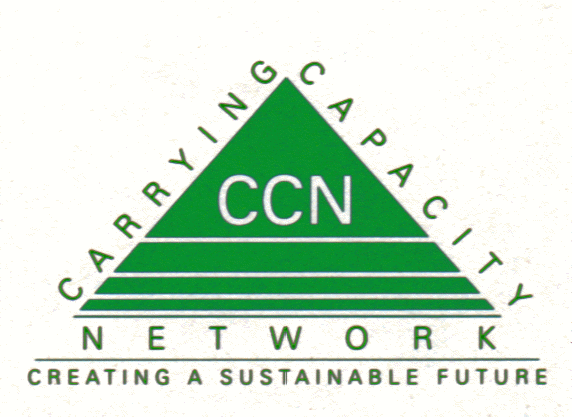|

CCN's 5 Point Program
National Revitalization
Population Stabilization Immigration Reduction Economic Sustainability Resource Conservation
WHAT IS CARRYING CAPACITY?
A common fallacy is to equate existing and seemingly open or "unused" spaces with the kind of resources and ecologically productive land needed to support human life under modern conditions. In fact, the criterion for determining whether a region is overpopulated is not land area, but carrying capacity.
Carrying capacity refers to the number of individuals who can be supported in a given area within natural resource limits, and without degrading the natural social, cultural and economic environment for present and future generations. The carrying capacity for any given area is not fixed. It can be altered by improved technology, but mostly it is changed for the worse by pressures which accompany a population increase. As the environment is degraded, carrying capacity actually shrinks, leaving the environment no longer able to support even the number of people who could formerly have lived in the area on a sustainable basis. No population can live beyond the environment's carrying capacity for very long.
The average American's "ecological footprint" (the demands an individual endowed with average amounts of resources, ie, land, water, food, fiber, waste assimilation and disposal, etc. puts on the environment) is about 12 acres, an area far greater than that taken up by one's residence and place of school or work and other places where he or she is.
We must think in terms of "carrying capacity" not land area. The effects of unfettered population growth drastically reduce the carrying capacity in the United States.
|
What is Carrying Capacity Network?
Carrying Capacity Network
confronts the controversial issues, makes the difficult choices,
and adopts the innovative approaches necessary to meet the
challenges facing our nation. CCN's action-oriented initiatives
focus on achieving national revitalization, population
stabilization, immigration reduction, economic sustainability,
and resource conservation.
A commitment to action to solve our nation's problems: Through CCN, action-oriented initatives combine the realistic
perspectives, targeted solutions, sound information, and
effective advocacy tools that get results by coordinating actions
to solve key national problems.
A stronger voice in shaping national policy: Working together through Network, individual activists,
grassroots groups, and national organizations increase
effectiveness by integrating their diverse issues within CCN's
unifying carrying capacity initiatives.
Information and analysis: CCN publications
provide the focus, facts, and analysis essential to defining
realistic solutions and effectively working to implement them on
the national, state, and local levels. With our e-mail, and fax Action Alert system, CCN offers its members the information
and tools necessary to facilitate effective action.
Network policy goals:
-
National Revitalization attained through
fostering education, family, community self-reliance,
tradition, and national unity.
-
Population Stabilization as soon as possible, provides the foundation for solving all other
problems.
-
Immigration Reduction achieved through
an immediate moratorium and eventual all-inclusive cap of
100,000 per year is the key to stopping U.S. population
growth.
-
Sustainable Economic Activity is based
on achieving a stable population, balanced budgets,
employment stability, and conservation of resources.
-
Resource Conservation including land,
energy, and water, provides the basis for a healthy
environment and sustainable economy.
CCN is a group of activists working to promote and conserve what's
right with America and to eliminate what's wrong with America. Most
of America's main problems - from traffic, to classroom crowding, to
pollution, depletion, welfare dependency, increasing taxes, and cultural
fragmentation, have deep roots in our unsustainable population growth.
Because of that, CCN focuses on stabilizing our population. We are even
willing to face the awkward demographic fact that immigration is the
cause of most of our recent growth (at current rates, immigration will
cause about 80% of our growth as we double in an estimated 50 years
or so).
CCN simply wants to conserve the best of America - before it's
developed, overrun, consumed, and polluted by runaway
population growth. It's not too late, and we hope that you will
join us in this effort.
Contacting CCN:
ISSN 1066-5404
The CCN Editorial Policy:
While Carrying Capacity Network
endeavors to make sure that all materials contained in our
publications are accurate, CCN is not responsible for the
reliability of information submitted for publication. CCN does
not sanction or endorse any views, policies, or activities of
groups or individuals, including members of CCN, except as may be
explicitly indicated. CCN will assume that when information is
submitted, permission is thereby granted to edit and provide
context before dissemination. Due to the volume of submissions,
CCN cannot guarantee that any particular item will be included or
that it will be included in its entirety. CCN will, however,
always endeavor to properly credit sources.
The content of this website--graphics, text and other elements--is ©2001 by Carrying Capacity Network, and may not be reprinted or retransmitted in whole or in part without the expressed written consent of the publisher.
|
Support
CCN! Our efforts cost money, and
only you can help. Start by making a secure donation today.
New ! Use FirstGov to contact your representatives in Congress, and track their records on issues vital to national sustainability:
Use
FirstGov to search for current news on pertinent legislation:
National
Board of Advisors
Virginia Abernethy
Nicolaas Bloembergen
William Catton, Jr.
Marisa Hsia Chang
Robert Costanza
Brock Evans
William Frey
Robert Kaufmann
Thomas E. Lovejoy
Dan Morris
Frank L. Morris, Sr.
Nancy Sue Pearlman
Marcia Pimentel
William E. Rees
Claudine Schneider
Alan Tonelson
Walter Youngquist |

